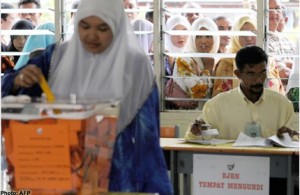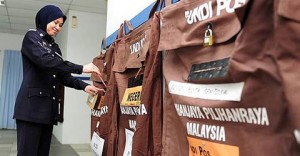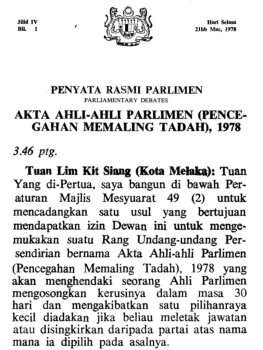 Opposition party’s PACAs face severe difficulties compared with BN PACAs. More than 64 percent of Malaysia’s parliamentary seats are rural in nature. In East Malaysia, many PACAs have to travel by airplanes, motorboats and four-wheel drives to reach the interior areas to monitor the polling process, often with their own funding.
Opposition party’s PACAs face severe difficulties compared with BN PACAs. More than 64 percent of Malaysia’s parliamentary seats are rural in nature. In East Malaysia, many PACAs have to travel by airplanes, motorboats and four-wheel drives to reach the interior areas to monitor the polling process, often with their own funding.
In enforcing the rules and conducting the polling and counting process honestly, the ROs’ impartiality is crucial. In the past, there have been cases where opposition PACAs have had problems with partisan ROs who refused to issue Form 14 (results certifying form) to them or allowed vote counting under very dubious circumstances (such as during blackouts). The PACA would not be able to do much under such circumstances except to refer to their election agents.
Opposition parties generally are not able to employ enough PACAs for all the polling streams. They are dependent on volunteers to fill their PACA posts. Often times, there is only one opposition PACA per polling voting stream i.e. no back up PACA.
It can be challenging for the onsite PACA to convey any news of discrepancy he found at the polling centre to his election agent to take the necessary actions. “Every polling stream needs at least two PACAs and a runner to be on standby to follow the ballot box (if necessary) to the counting centre,” Josephine adds.
Postal Vote Fraud?
 Postal voting is one of the contentious areas for opposition parties. In the past, DAP often did not allocate enough PACAs to monitor the postal voting. In the past, majority of postal voters voted certain parties due to fear and other factors.
Postal voting is one of the contentious areas for opposition parties. In the past, DAP often did not allocate enough PACAs to monitor the postal voting. In the past, majority of postal voters voted certain parties due to fear and other factors.
Josephine added, “We used to think that it was not worth our time and efforts to monitor them. Naturally we got no or few votes from the postal votes.”
“The postal voting by the civil servants on duty for polling day is often riddled with discrepancies and controversies,” Josephine elaborated.
EC helpers’ names are displayed on the electoral roll. They are also listed as postal voters. A PACA has to ensure they don’t vote again on the day of polling.
In addition, as postal voters are allowed to take their votes out of the polling station, there were instances where the votes have been sold to certain parties. In the last Sarawak state elections, two voters were allegedly captured on video as handing their votes to BN agents (Malaysian Insider, 13 April 2011).
The EC has declared that it will recruit more than 240,000 helpers to run the elections and they may be required to vote through postal voting in the next GE (Malaysiakini 22 March 2012).
With more volunteers available and effort put in to monitor them, the results have been better for opposition parties. In the 2011 Sarawak state elections, with round-the-clock PACA monitoring, DAP managed to obtain 60 postal votes in the Dudong and Bukit Assek state seats.
In the 2008 GE, where DAP had fewer PACAs monitoring the postal voting, both state seats combined contributed 14 postal votes for the DAP candidate. -The Rocket



